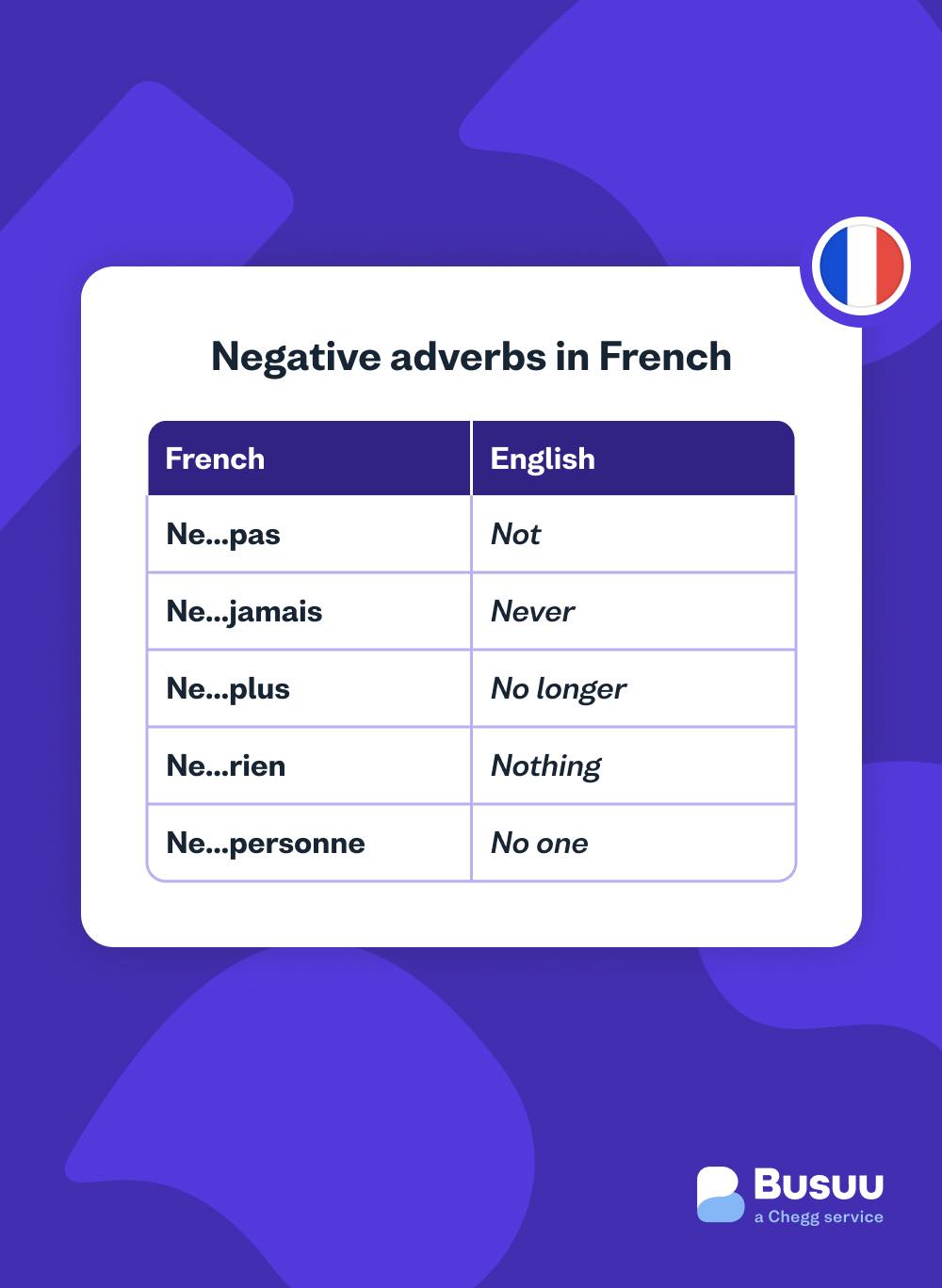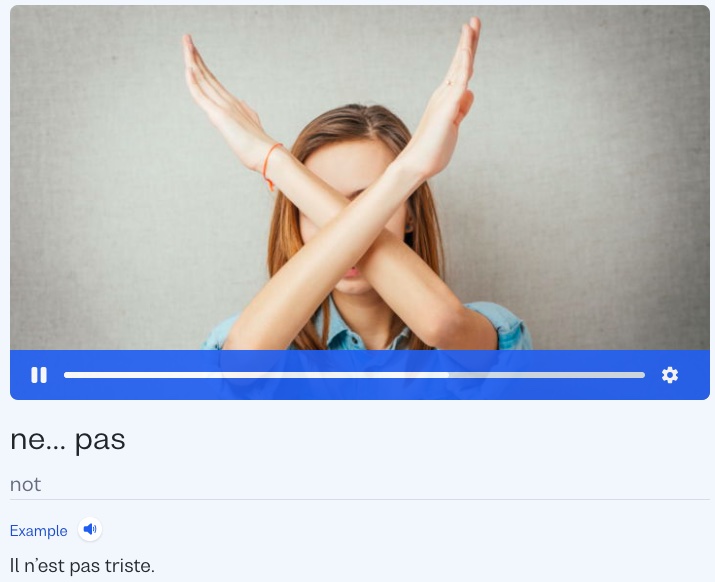French Negation: A Guide to Negative Expressions
Boost your language arsenal and learn how to say "no" in style.
I want to learn...
Negation plays a crucial role in any language, including French. Understanding how to form and use negative expressions is essential for effective communication. This comprehensive guide explores the fundamentals of French negation. It looks at the basic structure of negative sentences and even the nuances of negative adverbs, adjectives, and common expressions.
Get the knowledge you need now to confidently navigate a conversation in French.
How to form a negative sentence
In French, a negative sentence is formed by using the words "ne", “n’ ”, and "pas" around a verb. "Ne" comes before the verb, and "pas" follows it.
For example, "Je ne parle pas" means "I don't speak". The placement of "ne" and "pas" around the verb is the most basic form of creating a negative statement. Let’s get into more details.
Ne or n'
In both written and spoken French, the word "ne" is often shortened to "n' " when it precedes a verb starting with a vowel or a silent "h". For instance, "Je n'aime pas les légumes" (I don't like vegetables) is a common contraction. This contraction helps smooth out the pronunciation and flow of speech.
Usage of “ne” or “n’ ”
| French Sentence | English |
|---|---|
| Je ne parle pas français. | I don't speak French. |
| Il n'aime pas le café. | He doesn't like coffee. |
| Elle n'habite pas ici. | She doesn't live here. |
As seen in the table, when "ne" precedes a verb starting with a vowel or a silent "h", it contracts to "n' ". Feel free to practice using "ne" and "n' " in various sentences to become more comfortable with their use and pronunciation.
Dropping the "ne" in spoken French
In informal spoken French, it is common to drop the word "ne" and to only use the word "pas" to indicate negation. This is widely used in everyday conversations but you must avoid it in formal writing or when speaking in a formal setting. Dropping the "ne" simplifies the sentence structure and makes the conversation flow more naturally.
When to drop "ne"
| French Sentence (formal) | French Sentence (informal) | English |
|---|---|---|
| Je ne comprends pas. | Je comprends pas. | I don't understand. |
| Il ne veut pas sortir ce soir. | Il veut pas sortir ce soir. | He doesn't want to go out tonight. |
| Elle ne sait pas nager. | Elle sait pas nager. | She doesn't know how to swim. |
As seen in the table, in spoken French, the word "ne" is often dropped, and only "pas" is used to indicate negation. This is common among native speakers in informal settings. However, it's important to note that in formal contexts or when writing, you need to include the full negation with "ne" and "pas".
Negative adverbs
French uses specific negative adverbs to reinforce negation in sentences. Common negative adverbs include "jamais" (never), "rien" (nothing), "personne" (nobody), and "plus" (no more). These adverbs enhance the negative meaning of the sentence and provide clarity to the speaker's intention.

List of negative adverbs
| French Negative Adverb | English |
|---|---|
| Ne...pas | Not |
| Ne...jamais | Never |
| Ne...plus | No longer |
| Ne...rien | Nothing |
| Ne...personne | No one |
These negative adverbs, in combination with the word "ne", form a negative sentence. The placement of these adverbs varies depending on the verb tense and structure of the sentence. They express negation by adding nuances to your statements in French.
For instance:
- Je ne comprends pas. (I don't understand.)
- Il ne mange jamais de viande. (He never eats meat.)
- Elle ne danse plus. (She doesn't dance anymore.)
- Nous ne voyons rien. (We don't see anything.)
- Ils ne connaissent personne ici. (They don't know anyone here.)
- Elle n'a aucun livre. (She has no books.)
Negative adjectives
Negative adjectives express negation directly with the description of a noun. The most common negative adjective is "aucun(e)" (no, none). For example:
- Je n'ai aucun problème. (I have no problems.)
- Elle n'a aucune idée. (She has no idea.)
- Je n'ai aucun ami ici. (I have no friends here.)
- Elle n'a aucune expérience dans ce domaine. (She has no experience in this field.)
These adjectives negate the presence of something or deny a specific quality. They agree in gender with the noun they modify. By using negative adjectives, you convey negation or the absence of a certain attribute or characteristic in French sentences.
Common expressions
Negation is prevalent in many common French expressions. Some examples of these expressions add depth and emphasis to negative statements. These expressions provide additional ways to communicate negation in a different context. Here are some commonly used expressions in French:
-
Pas du tout: Not at all
Example: Je ne suis pas d'accord. Pas du tout. (I don't agree. Not at all.) -
Rien du tout: Nothing at all
Example: Je n'ai rien du tout à faire aujourd'hui. (I have nothing at all to do today.) -
Sans aucun doute: Without a doubt
Example: C'est la meilleure option, sans aucun doute. (It's the best choice, without a doubt.) -
Jamais de la vie: Never in my life
Example: Je ne monterai jamais de la vie sur ce manège. (I will never in my life ride that roller coaster.) -
Aucune chance: No chance
Example: Il n'y a aucune chance de réussir sans effort. (There is no chance of succeeding without effort.) -
Personne ne: No one
Example: Personne ne veut aller à cette fête. (No one wants to go to that party.)
Use these common expressions to express disagreement, emphasize the absence of something, or express certainty or doubt.
Recap
Negation plays a significant role in constructing negative sentences and conveying a range of meanings. The various elements of negation include the use of "ne" or "n' " in forming negative sentences, the dropping of "ne" in spoken French, negative adverbs, negative adjectives, and common expressions. "Ne" or "n' " is used as the main negation marker in French sentences. It is placed before the verb to indicate negation, and followed by "pas".
Negative adverbs express negation or denial of an action. These adverbs such as "ne...pas", "ne...jamais", and "ne...plus" allow you to convey different shades of negation. Negative adjectives describe something in a negative way, signaling the absence of a particular quality.
Lastly, expressions, including "pas du tout", "rien du tout", and "sans aucun doute", provide additional ways to communicate negation and express various emotions or opinions.
Incorporating these elements into your French language arsenal allows you to construct negative sentences, express denial, and convey a wide range of ideas and emotions in conversations. With practice the world of negation unlocks a richer and more nuanced way of expressing yourself in the language.
Get fluent in French today!
Discover the art of negation and revolutionize your conversations by practicing with a community of French native speakers at Busuu!

